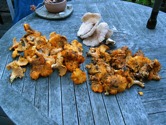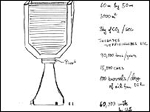 Watched a video of Dr. Seuss’ environmental parable The Lorax with Miles this evening. Pretty heavy stuff, and a bit complex for a three-year-old. Had forgotten about the awshum 70’s fuzztone wah-wah TV-funk-style soundtrack. Asked him halfway through whether the movie was making sense to him, and he said it was, though I suspected he was just enjoying the visuals more than anything.
Watched a video of Dr. Seuss’ environmental parable The Lorax with Miles this evening. Pretty heavy stuff, and a bit complex for a three-year-old. Had forgotten about the awshum 70’s fuzztone wah-wah TV-funk-style soundtrack. Asked him halfway through whether the movie was making sense to him, and he said it was, though I suspected he was just enjoying the visuals more than anything.
Afterwards, as the credits rolled over a landscape of clear-cut Truffula Tree forests and a sky blackened with smog from Thneed manufacturing plants, I asked him what the movie was about. “It’s about cleaning up,” he said. “Cleaning up what?” “Cleaning up the trees.” “And what happened at the end?” (The ending was only hinted at). “The boy got a seed for a tuffuffa twee and he planted it and it gwowed up.”
I’ll be damned, he did get it. And the concreteness of the fact that I will grow old and die while he and his friends deal with a choking planet — hit me so hard. Now here’s where it gets corny and painfully sincere: I almost cried. Looked at him, and gave him one of those big bear hugs, and he gave me one of those big bear hugs back, and I told him we have a big job to do, watching out for those Truffula Trees. But if anyone can do it, Miles can do it. If he wants to.



 If global warming is at least partly a function of global deforestation, we’re left with the problem of how to replace the de-carbonizing power of the billions of trees we’ve collectively disappeared in the blink of an historical eye. Dr Klaus Lackner
If global warming is at least partly a function of global deforestation, we’re left with the problem of how to replace the de-carbonizing power of the billions of trees we’ve collectively disappeared in the blink of an historical eye. Dr Klaus Lackner